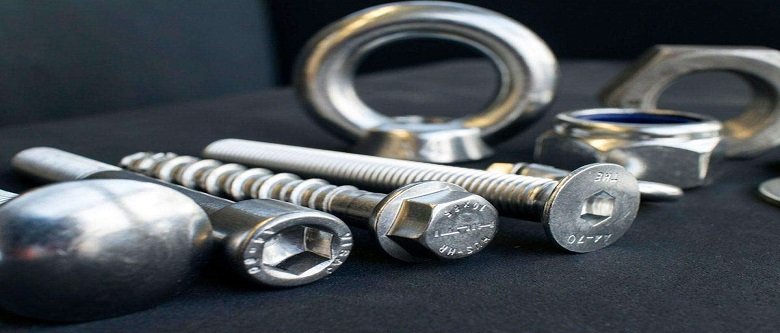Applications and Uses
- Chemical Industries
- Oil & Gas Industrires
- Power Plant Industries
- Shipbuilding Industries
- Fertilizer Industrires
- Petrochemical Industrires
- Sugar Industrires
- Cement Industrires


Duplex steel UNS S32205 bolts are one of the most highly demanded products in industries today. These bolts are known for their effective and efficient nature. Duplex Steel UNS S32205 is considered the most sturdy and robust grade. These bolts are generally used for extreme conditions and high temperatures.
Duplex steel UNS S32205 grade is considered one of the most sturdy grades. The most frequently used Duplex(ferritic/austenitic) stainless steel grade is duplex UNS S32205 Hex Head Bolts. Although duplex UNS S32205 has high solid temperature oxidation resistance, like other duplex stainless steel grades, it is susceptible to embrittlement when exposed to temperatures exceeding 300 degrees celsius for even short periods. Because of its ductile to brittle transition, duplex bolts are not typically appropriate for usage at temperatures over 300 degrees celsius due to precipitation of brittle micro components nor below -50 degrees celsius.
If duplex UNS S32205 bolts become brittle, they can only be repaired with a complete annealing process which is never really utilized over 300 degrees celsius. Solution treatment (annealing) - heat these duplex UNS S32205 bolts to 1020 degrees celsius - 1100 degrees celsius and cool quickly, which cannot be hardened further by thermal treatment. The strength of duplex UNS S32205 bolts is roughly double that of Type 304 austenitic stainless steel. Because of its outstanding corrosion resistance and high strength, duplex UNS S32205 bolts are used in various applications. The duplex UNS S32205 bolts also provide corrosion protection from organic acids such as acetic acids and formic acids. They also offer protection from inorganic acids that contain chloride. Due to the low carbon content in duplex UNS S32205 bolts, they are highly resistant to carbide-related intergranular corrosion. Duplex UNS S32205 bolts are also used in creating non-permanent joints, which can be dismantled on-demand with ease without causing any damage to the joining components. They also provide resistance towards stress corrosion cracking, especially in work chloride environments.
| Specifications | ASTM F593, F594, F1554 / ASME SF593, F594, F1554 |
| Standard |
DIN : DIN 934, DIN 931, DIN 970, DIN 933 UTS : UNEF, NPT, UNC, UNS, UNF, NPTF ISO : JIS standards, ISO 4033, ISO 4032, ANSI – American National Standards Institute ASME B18.5 ANSI B 28.2.4 1M as per defined in ASME B16.5 standard length ANSI B 18.2.4 2M as per defined in ASME B18.2.2 |
| Size | M3 - M56 | 3/6" to 2" | Custom Sizes |
| Length | 3 mm to 200 mm | Custom Sizes |
| Dimensions | DIN 931, 933, 934, 7991, 976, 125, ASME B18.2.1, B18.3 |
| Form | Hex, Threading, Square, Round as per Gauge Etc. |
| Threads | Unless otherwise specified, the threads shall be rolled or cut and tapped horizontally or vertically |
| Threads available | UNF, BSW, BSF, METRIC, UNC, or as required |
| Threads Configuration |
ASME B1.1 2A/3A – 2B/3B Inch Unified Threads and B1.13M 6h-6G Metric Coarse Threads |
| Certification | Dual Certified As per ASTM & ASME Codes |
| Test Certificate | As per EN 10204 / 3.1 Manufacturer Test Certificate, PED 97/23/EC Certified, Merkblatt AD 2000 W2 Certified |
| Raw materials Source | JSPL, Mukund Steel, Tata Steel, Dhamm Steel, Usha Martin,etc. |
| Packing | IN BULK: canton, pallet, Small Boxs / carton / pallet, or customer request |
| Surface Coating |
Cadmium Coating Hot Dipped Galvanizing Coating Ptfe Coated Phosphate Coating Teflon Coating Xylon Coating Zinc Coating |
| STANDARD | UNS | WERKSTOFF NR. | AFNOR | EN | JIS | SIS | GOST |
| DUPLEX 2205 | S32205 | 1.4462 | - | - | - | - | - |
| Grade | C | Mn | Si | P | S | Cr | Mo | Ni | N | Fe |
| S32205 | 0.030 max | 2.00 max | 1.00 max | 0.030 max | 0.020 max | 21.0 – 23.0 | 2.50 - 3.50 | 4.50 – 6.50 | 0.8 – 0.20 | 63.54 min |
| Density | Melting Point | Yield Strength (0.2%Offset) | Tensile Strength | Elongation |
| 7.8 g/cm3 | 1350 °C (2460 °F) | Psi – 80000 , MPa – 550 | Psi – 116000 , MPa – 800 | 15 % |
